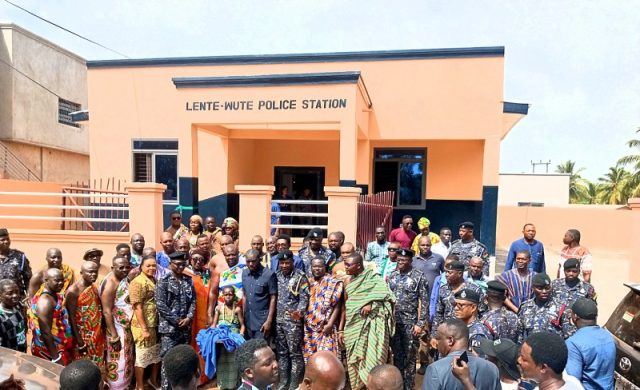By Jones Anlimah
The educational and security infrastructural deficits in Lente-Wute in the Ketu South Municipality of the Volta Region have received a major boost. This follows the inauguration of two critical infrastructure projects: a Junior High School block and a police station under the theme, “Providing Quality Education in a Safe, Sound Environment: The Role of Citizens and Government.”
The two projects are expected to improve access to education and enhance learning outcomes, as well as strengthen security and promote safety in the community. A philanthropist and native of the area, Mr. Akonta Felix Akakpo, provided the two projects.
The Junior High School block is expected to enhance access to education by providing a closer and more conducive learning environment for students, while the police station is expected to strengthen security in the community, helping to reduce crime and instill a sense of safety and order among residents.
The Volta Regional Police Commander, DCOP Andrews Boadu-Ekumah, expressed gratitude for the establishment of the new police station and emphasised its importance in maintaining peace and security in Lente-Wute and its surroundings. “This new police station will greatly enhance our ability to provide timely and effective security services to the people of Lente-Wute. It will serve as a critical hub for crime prevention, law enforcement, and promoting a sense of safety among the community,” he said.
“As we strengthen our presence in this area, I urge community members to collaborate with the police to ensure a peaceful environment. Together, we can create a safe and secure community that encourages growth and development,” DCOP Boadu-Ekumah added.
The Volta Regional Director of Education, Francis Agbemadi, commended the gesture, describing it as a vital contribution toward improving access to education in underserved areas. He emphasised that quality education thrives in a conducive environment, both physically and emotionally.
“Education is the cornerstone of every society’s development, and I commend the Lente-Wute community for taking this important step to ensure their children receive quality education in a safe and well-structured environment. This Junior High School block will not only bring education closer to the children but also improve the literacy rate in the region,” he stated.
Mr. Agbemadi also urged other citizens and stakeholders to emulate such acts of selflessness to bridge infrastructural gaps in education in the region.
Mr. Akonta Felix Akakpo, who also doubles as the development chief of the Aflao Traditional Area, expressed his heartfelt gratitude for the opportunity to contribute to the development of his hometown. He noted that the projects were inspired by his desire to address the educational and security challenges that had long plagued the community.
“These projects were made possible through my personal resources, driven by my passion for community development and commitment to improving the lives of our citizens,” he said.
Mr. Akakpo further called on both the government and private individuals to partner in developing the Volta Region. “Today’s inauguration is a testament to what can be achieved through individual initiative, community spirit, and collaboration. I encourage all of us to strive for excellence, support one another, and work towards a brighter future,” he noted.
The Paramount Chief of the Aflao Traditional Area, Togbuiga Amenya Fiti V, praised Akonta Felix Akakpo for his dedication and vision. He described the projects as transformative for the community, stressing the importance of citizen-government collaboration.
He also urged parents in the community to prioritise their children’s education and make full use of the new educational facility.
The provision of the police post and the JHS block marks a step closer to bridging infrastructural deficits in the Ketu South Municipality and serves as a model for other communities striving for progress in the region. These projects are also likely to inspire further development initiatives, as education and security form the foundation for economic and social progress.









![Fuse ODG violently handcuffed, dragged out of his car by UK Police over alleged ‘Wee’ smell [Video]](https://ghananewss.com/storage/2023/05/Fuse-ODG-hand-100x75.jpeg)








